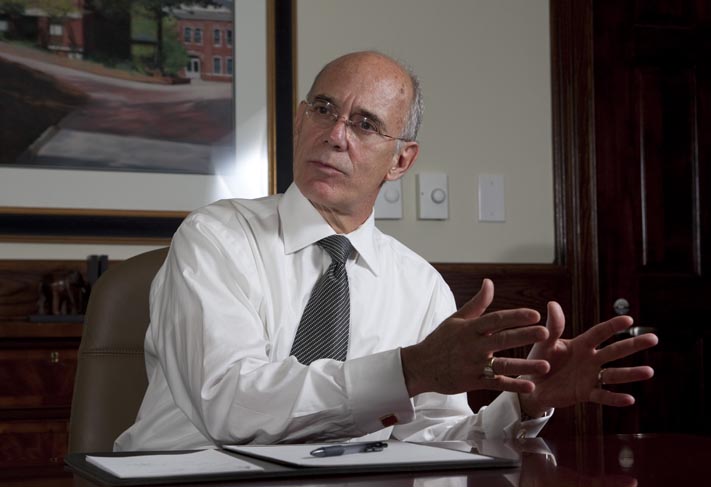[media-credit name=”Eric Mansfield” align=”aligncenter” width=”398″] [/media-credit]Earlier this November, schools around the nation, including Emory, Duke and Northwestern, began a partnership entitled Semester Online, a new alternative to the popular trending free and non-credit massive open online courses (MOOCs) offered by Tech and its contemporaries, like MIT, Harvard and Stanford.
[/media-credit]Earlier this November, schools around the nation, including Emory, Duke and Northwestern, began a partnership entitled Semester Online, a new alternative to the popular trending free and non-credit massive open online courses (MOOCs) offered by Tech and its contemporaries, like MIT, Harvard and Stanford.
Semester Online, unlike MOOCs, offers tuition-based, for-credit online courses taught by university professors from its consortium.
“We do not currently have any plans to become more involved with Semester Online, but we expect to continue to play a national leadership role in the development of online courses,” said Rich DeMillo, the director of Georgia Tech’s Center for 21st Century Universities (C21U).
However, this does not mean that these efforts by Semester Online are going unnoticed.
“C21U is experimenting with a variety of new delivery technologies, or ‘platforms’. MOOC platforms, like Coursera, have caught the attention of the public around the world and are the most active initiatives at the moment, but we are at the early stages of technology development, and we are closely following related efforts like Semester Online,” DeMillo said.
Dr. Rafael Bras, Provost and Executive Vice-President for Academic Affairs, confirmed this statement by DeMillo, disfavoring the for-credit nature of SemesterOnline.
“Ours is a residential education, and we strongly believe in that residential experience. Content online will ultimately be used to augment and improve our residential education. It is not inconceivable, though, that as more experience is gained with MOOCs that some courses could be appropriately certified by our faculty for Georgia Tech credit,” Bras said.
“An essential aspect of a MOOC is that it be ‘open.’ Semester Online is not open,” DeMillo said. “But it is an interesting approach to technology-mediated teaching. It is just one of the several competing approaches to online course delivery.”
“Several faculty are already experimenting with ‘inverted classrooms’ where students listen to lectures and receive content and some assessment in an online platform and attend class to engage in problem-solving and more open discussions,” Bras said.
Tech has already been heavily involved in offering “non-free” online courses through its own platforms similar in structure to the newly developed SemesterOnline.
“Georgia Tech already has 35 years of experience in online education. Many of our residential students and many others outside the Georgia Tech campus have benefitted from offerings of the Georgia Tech Professional Education Programs (GTPE),” Bras said.
With multiple offerings ranging from calculus courses for high school students to professional master’s degrees, GTPE has been able to serve the more than 8,500 enrollments in online courses over the past six years.
GTPE was able to award 140 MS degree recipients this past academic year from online degree programs while approximately 330 online high school students were able to take sophomore level calculus classes as peers with traditional Tech campus-based students according to Nelson Baker, the dean of Georgia Tech Professional Education.
MOOCs provide additional opportunities for both access to education as well as for better understanding of how students learn rather than offering credit at Universities. Bras further recommended the use of MOOCs in general as a curricular supplement instead of a credit-based class.
“In the MOOC space, Georgia Tech already has a significant number of offerings and will be developing more. By the end of the year, we expect some 20 courses to be available through Coursera and other platforms, including at least three general education courses…supported by grants from the Gates Foundation,” Bras said.